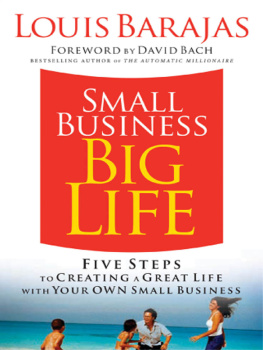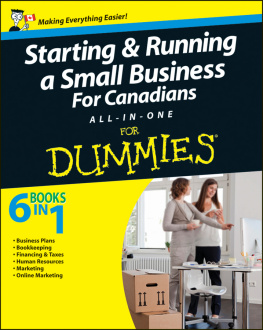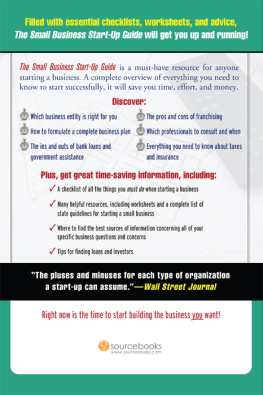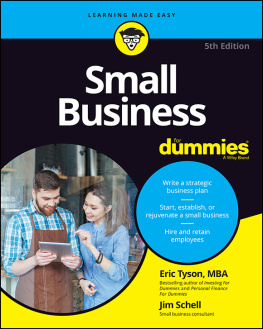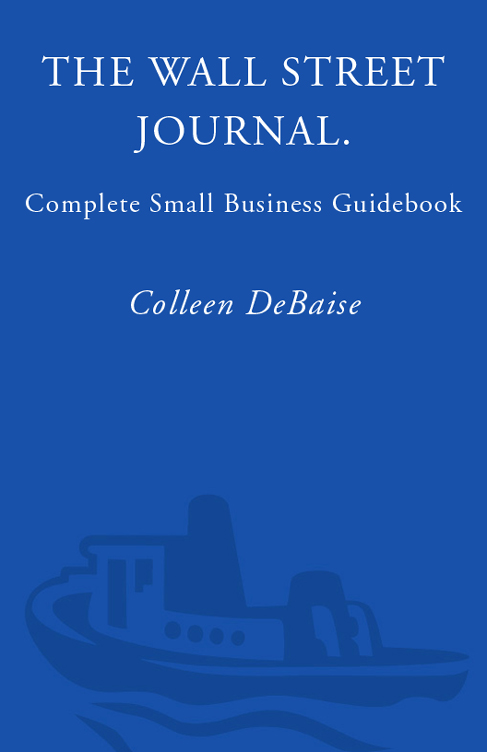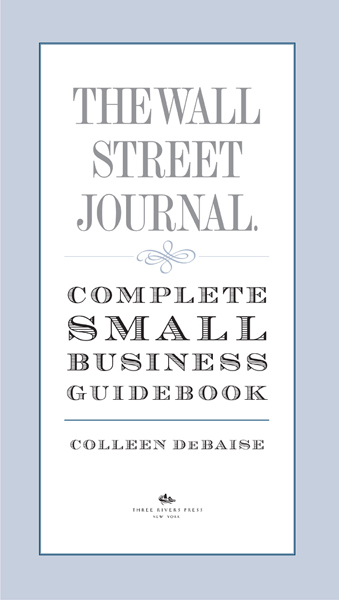When I meet with entrepreneurs, I hear about their dreams. They tell me why they think their product or service is exciting or game-changing or utterly unlike anything else thats out there. And no matter what stage of the process theyre in, theres one thing thats unfailingly the same: theres passion.
I met with several start-up entrepreneurs at a holiday event in December 2008 when the markets had just collapsed and dire days, it seemed, were upon us. But at this gathering hosted by the networking group Savor the Success, I talked to new business owners who had just left the doldrums of corporate America and who were eager, at last, to be striking out on their own. The excitement in their voices was undeniable and contagious. It is not something you hear when talking to people who merely punch a clock or who while away the hours doing something they dont think is important or meaningful or fulfilling.
In the spring of 2009, I had the good fortune to sit down with one of those entrepreneurs whose story is enviable: he had come up with a unique product, been able to market it to the masses and had achieved great success and fortune. That entrepreneur was Jim Koch, the founder of Boston Beer Company, the leading independent brewer in the United States, and the creator of its well-loved Sam Adams beer.
We sat in his brewery in Boston, a sprawling brick building in the multicultural neighborhood of Jamaica Plain. Like most entrepreneurs, he didnt wear a suit or tie; he wore khakis and a company denim shirt with the Sam Adams logo. It was easy to forget that he now presides over a publicly traded company that makes some $400 million in annual revenue. In the early 1980s, he was working as a high-paid management consultant when he decided to quit, carry on a family tradition of brewing beer, and start a company that could craft a beverage more flavorful than mass-produced beer. In the first five minutes of our conversation, Koch quietly told me how he loved that beer cut through every demographic: it appealed to and connected people of every gender and ethnicity, from every place and socio-economic status.
Then, before I could ask him about his secrets of success, he volunteered his recipe for Sam Adams Spring Ale, a seasonal brew offered each spring. And thats when I heard that familiar excitement in his voice. We start with water, yeast, malt and hops, the basic ingredients of every beer, he said in the manner of a storyteller about to spin a tale. Then we add spices. Orange zest and a touch of coriander. Then rose hips, plums and hibiscus. Lemon zest, vanilla and a little anisejust to spark some interest. Next, a dash of grains of paradise, a West African spice which has an orchid-like aroma. And to finish it all, tamarind, an exotic ingredient often used in Asian cooking. Wow, I said appreciatively. I wasnt sure what I had expected, but I had thought wed be talking about more dry business topics, such as organizational goals or corporate governance. Instead, Koch sounded a lot like a start-up entrepreneur. As a brewer, I can do that, said Koch, still eagerly talking about his recipe. And thats just one beer.
Entrepreneurswhether theyre just out of the gate or have years of experiencealways seem to have this fire inside them. Thats not to say that business owners tell me its easy to run the showor that it doesnt consume their time, drain their energy or test their mettle. I once memorably heard a stressed-out entrepreneur say theres no greater prison than opening your own shop. But I also hear about the rewards. Perhaps more than anything, those who start their own business know theyve got freedom to follow their passion, to call the shots, to hire whom they want, to work when they want and to take their business as far as they want.
But what puts a person like Jim Koch on the path to success? Some of the very same strategies that are outlined in the pages of this book. He cemented his vision for a beer company by talking to mentors, most notably his dad, a retired brewer. He augmented his personal savings by raising start-up capital from friends and family. He used that money wisely and sparingly. He thought outside the box, essentially renting out breweries to make his beer when he didnt yet have enough in profits to build his own facility. He concentrated on making a quality, full-flavored product that was better than huge competitors lighter beer. He wore many hats. Most notably, he learned to embrace salesmanship, something he originally dreaded but eventually found so enjoyableand informativethat he still goes on sales calls. And he did what made him happy, something he advises anyone currently not satisfied in their line of work to do. Find a business that youll be happy doing even if doesnt make your rich, he said. And make sure your product is betteror cheaperthan what others have.
If you are ready to turn your passion into a successful business, youve come to a trusted source for guidance. In Part One, well focus on the commitment youll need and how to find enough cash to start and grow your business. In Part Two, well get into the mechanics of running a business, from hiring employees to investing in technology to staging your exit. And in Part Three, Ill tell you ways to strike work/life balance in the always open for business lifestyle of entrepreneurs.


